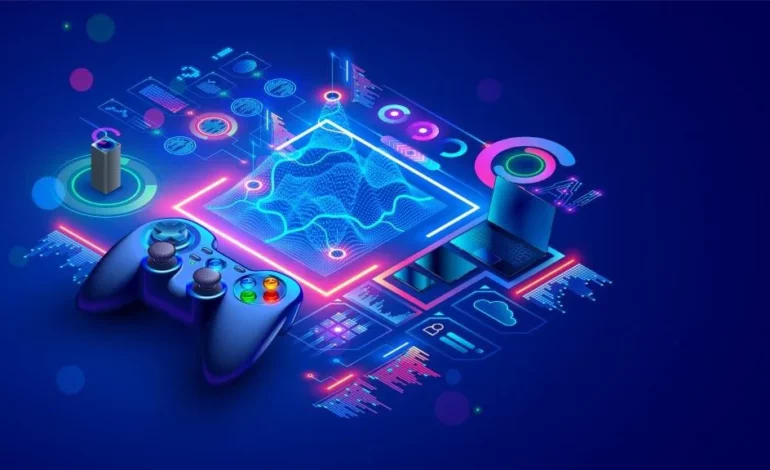Transforming the iGaming Industry: Blockchain Technology Impact

The iGaming industry, a sector already known for its rapid technological advancements and significant revenue generation, is now experiencing a new wave of transformation thanks to blockchain technology. This revolutionary technology, most recognized for its association with cryptocurrencies like Bitcoin, is reshaping online gaming to be more secure, transparent, and accessible internationally. Blockchain’s decentralized nature not only enhances security and player trust but also opens up innovative avenues for game development, participant engagement, and monetization strategies. As we delve deeper into how blockchain is revolutionizing the iGaming industry, we’ll explore its impact on digital asset ownership, game integrity, and the broader implications for the future of online gaming.
Blockchain Technology Overview:
Definition and Components of Blockchain
Blockchain technology is a decentralized digital ledger that records transactions across multiple computers. This ensures that the records cannot be altered retroactively without the alteration of all subsequent blocks and the consensus of the network. The key components of blockchain include a distributed ledger, cryptographic hashing, consensus mechanisms, and smart contracts. These elements work together to ensure the security, transparency, and integrity of transactions, making blockchain a robust and secure platform for various applications, particularly in digital transactions and online gaming.
Impact of Blockchain Technology on Digital Transactions
Blockchain technology significantly transforms digital transactions by enhancing security, increasing transparency, and reducing costs. It provides a secure environment for transactions by using cryptographic techniques, where each transaction is encrypted and linked to the previous one, making it almost impossible to alter. This immutability is crucial in preventing fraud and ensuring the integrity of the data. Additionally, by removing intermediaries such as banks and payment processors, blockchain reduces transaction fees and processing times. The decentralized nature of blockchain ensures that transactions are transparent and accessible to all participants, fostering trust and collaboration among users.
Advancements in iGaming with Blockchain Technology:
Enhanced Security and Fraud Reduction
Blockchain’s inherent features offer enhanced security measures for the iGaming industry. The use of decentralized technology means that gaming outcomes are recorded on a public ledger, visible to all players but not alterable by any single entity. This significantly reduces the possibilities of fraud and cheating, as every transaction and gaming result is verifiable on the blockchain. With the application of smart contracts, payments, and rewards can be automatically processed according to predefined rules and conditions, further reducing the risk of manipulation and ensuring fairness and transparency in online gaming environments.
Ownership and Scarcity of Digital Assets
In the iGaming industry, blockchain facilitates true digital ownership and scarcity of in-game assets through the use of non-fungible tokens (NFTs). Players can truly own their in-game items, such as skins, characters, and other digital goods, as these assets are tokenized on the blockchain. This not only enhances the value of digital assets but also allows for secure trading and selling, creating a vibrant market for in-game items. Additionally, the scarcity of certain assets can be verified through the blockchain, increasing their value and appeal among gamers.
Streamlining Payments and Transactions
Blockchain technology simplifies payment processes in the iGaming industry by enabling fast, transparent, and secure transactions with cryptocurrencies. Blockchain eliminates the need for third-party payment processors, reducing costs and improving the speed of transactions. Players can make deposits and withdrawals instantaneously, which enhances user satisfaction and trust. Moreover, the use of cryptocurrencies opens up iGaming platforms to a global audience, bypassing the limitations and regulations associated with traditional currencies. This global accessibility not only drives growth for the platforms but also provides players from various regions with equal opportunities to participate and win.
Challenges and Future Prospects:

The integration of blockchain technology in the iGaming industry, while promising, is not without its challenges. However, these hurdles pave the way for a plethora of future opportunities that could redefine online gaming.
Technical and Regulatory Hurdles
Blockchain technology presents several technical challenges, including scalability and transaction speed issues. Blockchain networks, especially those that are most secure and decentralized, often face difficulties in processing large volumes of transactions swiftly. In the gaming industry, where real-time and high-speed interactions are crucial, this can be a significant bottleneck.
Another critical area of concern is regulatory compliance. The iGaming industry is heavily regulated across different jurisdictions. The decentralized and often opaque nature of blockchain can complicate compliance with these regulatory frameworks. For it to be adopted widely, blockchain solutions must align with international gambling regulations, and anti-money laundering (AML) standards, and ensure responsible gaming.
Innovations and Future Outlook
Despite the challenges, blockchain is poised to generate groundbreaking innovations in the iGaming sector. Prospects include the development of fully decentralized gaming platforms where players have complete control and transparency over gaming mechanics and financial transactions. There is also potential for the rise of AI-driven smart contracts that can automate payouts, bets, and compliance checks, significantly enhancing operational efficiency and player trust.
Advancements in blockchain interoperability could further enrich the gaming experience by allowing assets and identities to be used across various games and platforms seamlessly. Combining blockchain with other emerging technologies like VR could lead to the creation of more immersive and secure gaming environments.
Market Adoption and Industry Impact
The adoption of blockchain in iGaming is gradually gaining momentum as stakeholders recognize the benefits of increased security, reduced fraud, and enhanced player engagement. Blockchain enables a higher level of transparency and fairness, which can help iGaming platforms attract a broader audience. Moreover, the inherent security features of blockchain reduce the risks of hacks and data breaches, offering a safer environment for players.
The economic impact is also notable. Blockchain facilitates lower transaction fees and quicker payouts, making gaming platforms more attractive to users. Additionally, the tokenization of assets and introduction of cryptocurrencies as a payment option open new revenue streams and market opportunities.
In conclusion, while blockchain faces several technical and regulatory challenges in the iGaming industry, the innovative solutions and profound market impact it promises could significantly transform the landscape. As technology continues to evolve and address existing hurdles, the future of iGaming appears increasingly intertwined with blockchain, heralding a new era of secure, transparent, and decentralized gaming experiences.
Conclusion
Blockchain technology is significantly reshaping the iGaming industry, introducing revolutionary changes that enhance security, transparency, and player autonomy. By decentralizing control over gaming processes and financial transactions, blockchain provides a robust framework that diminishes the risks of fraud and enhances user trust. Moreover, the technology’s ability to offer true ownership of digital assets through NFTs and to enable cross-game interoperability presents new opportunities for gamers to engage in more expansive and personalized gaming experiences.
Furthermore, the play-to-earn model, underpinned by blockchain, is not only attracting more participants but is also creating new revenue streams for players, particularly in underemployed regions. The integration of smart contracts automates and secures transactions and interactions within games, reducing the need for intermediaries and ensuring fair and timely rewards for players’ achievements.
While the full potential of blockchain in iGaming is still unfolding, early adopters are seeing improvements in security, user engagement, and financial operations. As the technology continues to evolve, it is expected to break down more barriers, offering even more seamless experiences and creating a more inclusive, fair, and lucrative landscape for all stakeholders in the iGaming industry. The transformative effects of blockchain technology in iGaming are profound, marking the beginning of a more secure, transparent, and innovative era in online gaming.










